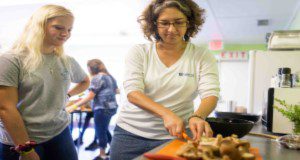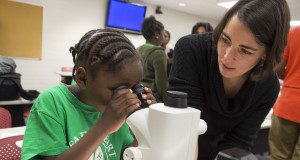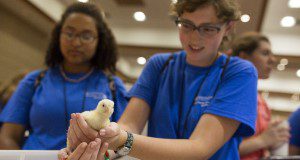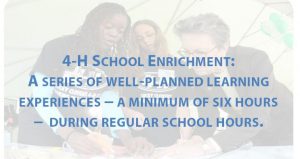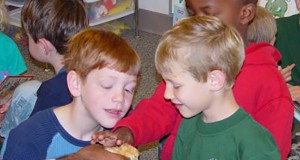Positive Youth Development (PYD) promotes building life skills, leadership, and relationships, and Social Emotional Learning (SEL) promotes knowledge, responsibility, and caring. Just as 4-H uses PYD as a framework, so schools use SEL. A whole program approach with appropriate curriculum provide the skills necessary for youth to succeed. This new 5-page publication of the UF/IFAS 4-H Youth Development Program explores the complementary relationship between PYD and SEL in a school-based program setting. Written by Vanessa Spero-Swingle.
https://edis.ifas.ufl.edu/4h404
Tag: Vanessa Spero-Swingle
School-Based 4-H Programming Series: Setting Schools Up for Success
Success at school-based sites to form 4-H clubs and programs will depend on utilizing the developmental practices of positive youth development and incorporating a set of principles known as the Essential Elements. Youth benefit from feeling like they belong, mastering a skill, gaining independence, and exhibiting generosity. The 4-H club atmosphere provides a setting for youth to achieve lifelong skills as long as they are given the opportunity to learn them. This new 4-page publication of the UF/IFAS 4-H Youth and Development Program was written by Vanessa Spero-Swingle.
https://edis.ifas.ufl.edu/4h405
School-Based 4-H Programming Series: Designing Programs Based on Time Involvement
One of the biggest factors to consider when starting a school-based program is the amount of time and level of commitment that can be provided for the 4-H program at that site. This new 5-page document discusses the degree of commitment, intensity, and Positive Youth Development (PYD) impact of the program. The most PYD-intensive program will include a model for sustainability. Sustainable programs will ultimately survive and thrive without continual supervision and daily maintenance. Written by Vanessa Spero-Swingle and published by the UF/IFAS 4-H Youth Development Program.
https://edis.ifas.ufl.edu/4h406
School-Based 4-H Programming: Incorporating Family Engagement into Your Program
Family engagement in 4-H programs allows family members, youth, and the community to become more aware, cohesive, and invested in youth development. This 4-page fact sheet, written by Vanessa Spero-Swingle and published by the UF/IFAS Florida 4-H Youth Development Program, discusses how to incorporate family engagement into your 4-H school programming. For the purposes of Florida 4-H, a school-based program can be defined as school enrichment (offered to groups of youth, taught by Extension staff or trained volunteers, and designed to support the school curriculum), an in-school club following a more traditional club approach during school hours, or an after-school club operating directly after school hours.
https://edis.ifas.ufl.edu/4h401
School-Based 4-H Programming: Middle and High School-Age Youth Programs
All youth, regardless of age, are at risk for engaging in negative behaviors that can get them into trouble during the afterschool hours when parents and other family members are at work. Middle and high school-age youth are at an age where they can most benefit from increasing opportunities to participate in programs with a positive adult role model, gain necessary life skills, and increase their knowledge of accessible opportunities. Middle and high school programs have the potential to support graduation rates and increase post-secondary school success. This 4-page publication of the UF/IFAS Florida 4-H Youth Development Program provides strategies for success in developing these programs in your community. Written by Vanessa Spero-Swingle.
https://edis.ifas.ufl.edu/4h400
School-Based 4-H Programming: Working with Partners Effectively
Partnerships open a world of possibilities. Partnerships provide an opportunity for multiple organizations to address community challenges while benefiting at the same time through shared resources, funding, personnel, and expertise. Desiring to partner with a school-based site is beneficial, but not always easy to implement. Being professional in your collaboration, prepared in your assessment, and intentional about your needs are ways to increase the likelihood of a successful partnership. This 4-page publication of the UF/IFAS Florida 4-H Youth Development program offers tips and strategies to build healthy, mutually beneficial partnerships in your program. Written by Vanessa Spero-Swingle.
https://edis.ifas.ufl.edu/4h399
School-Based 4-H Programming: Getting Started
School-based programs provide an opportunity to youth who would not be able to participate in traditional 4-H club offerings otherwise. If you want to expand your 4-H program in diversity, subject matter, and/or number of youth reached, school-based programming may be the solution for you. This 6-page document discusses school-based programs, differences between school-based programming and traditional club programming, reasons to start school-based programs, ways to work with school sites, and enrollment for school-based program youth. It is part of the 4-H 101 Fact Sheet series. Written by Vanessa Spero-Swingle and Susan Munyan, and published by the UF/IFAS 4-H Youth Development Department, April 2018.
http://edis.ifas.ufl.edu/4h389
Next Stop: Job!
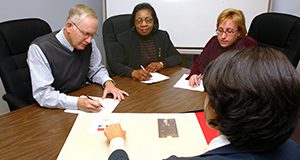 Next Stop: Job is a multi-lesson program designed to teach youth, ages 14 and up, the skills necessary to obtain a job. Through videos and hands-on activities, youth learn essential job market skills, such as marketing, communication, writing skills, and financial literacy, to help them succeed in the workplace. This 28-page publication discusses cover letters, resumes, interviews, proper attire, and management of earnings. Written by Vanessa Spero-Swingle, Laura Cash, Laura Valencia, Gayle Whitworth, Karen Miliffe, and Shane Michael, and published by the UF/IFAS 4-H Youth Development Department, June 2017.
Next Stop: Job is a multi-lesson program designed to teach youth, ages 14 and up, the skills necessary to obtain a job. Through videos and hands-on activities, youth learn essential job market skills, such as marketing, communication, writing skills, and financial literacy, to help them succeed in the workplace. This 28-page publication discusses cover letters, resumes, interviews, proper attire, and management of earnings. Written by Vanessa Spero-Swingle, Laura Cash, Laura Valencia, Gayle Whitworth, Karen Miliffe, and Shane Michael, and published by the UF/IFAS 4-H Youth Development Department, June 2017.
http://edis.ifas.ufl.edu/4h377
